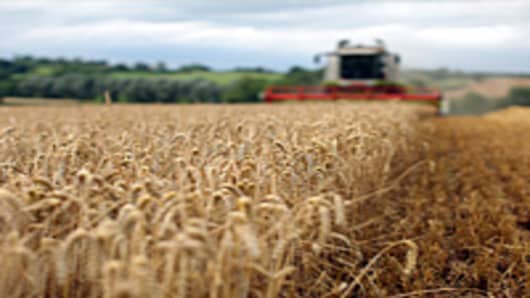The world should “be prepared” for even higher food prices next year if cereal production fails to increase significantly, the United Nations warned on Wednesday.
The warning from the UN’s Food and Agriculture Organisation came as the body forecast that the global bill for food imports will top $1,000 billion for just the second time, adding to fears of rising inflationin emerging countries from China to India.
It said the food import bill would surge to $1,026 billion this year, up nearly 15 percent from 2009 and within a whisker of an all-time high of $1,031 billion set in 2008 during the food crisis.
“With the pressure on world prices of most commodities not abating, the international community must remain vigilant against further supply shocks in 2011 and be prepared,” the FAO said. “With price increases largely reflecting scarcity in export supply, global competition for securing foodstuffs is set to intensify.”
The FAO painted a worrying picture in its twice yearly Food Outlook report, warning that it was crucial for farmers to “expand substantially” cereal production in 2011-12 to meet expected demand and to rebuild world reserves.
But the Rome-based agency warned the production response could be limited as rising food prices have made other crops, from sugar to soyabean to cotton, attractive to grow.
“This could limit individual crop production responses to levels that would be insufficient to alleviate market tightness. Against this backdrop, consumers may have little choice but to pay higher prices for their food,” the FAO said.
Winter planting of wheat – the world’s most important crop – has so far been below expectations as drought conditions in Russia, an important producer, have hampered seeding.
The FAO has until now largely downplayed the gravity of the developing crisis, forecasting lower prices next year.
But the new forecasts signal that FAO officials now believe further prices rises are likely in 2011.
The warning is the strongest yet of a potential repetition of the 2007-08 food crisis, when the cost of agricultural commodities surged to a record and sparked food riots in poor countries.
Agricultural commodities prices have surged after a series of crop failures caused by bad weather.
The situation was aggravated by large producer nations such as Russia and Ukraine imposing export restrictions and the weakness of theUS dollar.
In spite of the rising prices, the FAO insisted the outlook was not as difficult as it was two years ago because of higher reserves.
But it added: “Following a series of unexpected downward revisions to crop forecasts in several major producing countries, world prices have risen alarmingly and at a much faster pace than in 2007-08.”
Agricultural commodities prices have fallen over the past week amid a sell off in global markets, but analysts and traders continue to expect higher prices in 2011.
The FAO’s food index, a basket tracking the wholesale cost of wheat, corn, rice, oilseeds, dairy products, sugar and meats, jumped last month to levels last seen at the peak of the 2007-08 crisis.
The index rose in October to 197.1 points – up nearly 5 percent from September –, surpassing the levels seen during the early stages of the 2007-08 food crisis and only below its peak between February and July of 2008.


